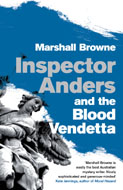 | Marshall Browne INSPECTOR ANDERS AND THE BLOOD VENDETTA Random House, 341 pp. Source: review copy Review by Perry Middlemiss |
There is a theory, to which I am becoming more and more attuned, that tension in British and US police procedural crime novels is created in two, very different ways. In the US version, the main protagonist fights the bulk of his battles with other branches of the justice machinery: if he works in homicide, then the FBI tries to interfere, and if he works for the Justice Department then it's likely to be a local detective that gets under his feet and in his way - Michael Connelly's Harry Bosch is an excellent example of this. Ian Rankin's Inspector Rebus, on the British side of the equation, has no such external agencies getting in his way. He has to work against his superiors, acting as an outsider to their bureaucratic inertia. Rebus is considered a maverick by his bosses, while Bosch is looked upon almost as a star by his.
There is, by implication, a third way: a pan-continental approach that uses tensions within and across countries, and between varying political forces, both legal and illegal. I have come across very few of these novels outside the purely "spy thriller" genre, such as Forsyth's Day of the Jackal. Few straight-forward mystery novels attempt to tackle the tensions listed above; whether for wont of material or ambition I'm not sure. So it is with a genuine sense of interest and the prospect of a new direction that we can approach the Inspector Anders novels of Melbourne writer Marshall Browne.
We first met the Italian inspector in The Wooden Leg of Inspector Anders in 1999, which was followed by Inspector Anders and the Ship of Fools in 2001. And we now have the third novel in the series, one to be savoured.
In the first novel one-legged Anders is seconded to southern Italy to examine the murder of an investigating magistrate, a case that the inspector solves in explosive fashion and which only enhances his reputation as a major anti-terrorism expert. Browne won a Ned Kelly Award for Best First Novel for this book, and was lauded by such newspapers as the "Los Angeles Times". It was an auspicious debut. The second in the series saw Anders working in the modern Europe, tracking a killer of high-flying businessmen; a killer with a political agenda who doesn't restrict himself to one country or jurisdiction. I don't believe this novel was as successful as the first: the scope was too diverse, it was hard to keep track of the many minor characters flitting across the main stage, and the many changes of locale tended to dilute the tension. Now, however, Anders is back on track, back in Italy and investigating a series of political assassinations which have the authorities convinced the terrorist Red Brigades have re-surfaced.
Summoned back from his position in Europol in France to Milan, Anders rapidly finds himself at odds with his fellow workers (they believe, rightly, that the Mafia is out to get him and don't want to be caught in the cross-fire); his superiors who would prefer to handle the investigation their way; his political masters who want him to finish his work in a hurry but who don't want him to dig too deeply into peripheral matters; and his "southern friends" who desperately want to enact a brutal revenge for his previous bloody encounters with them. Stirred together it makes for a heady mix. The murders continue with few if any clues, and the Left and Right of Italian politics start blaming each other for the mess. Anders digs ever deeper into the case, following his own lines of thought, hunches and conjectures, sometimes sucessfully and sometimes to the exasperation of his colleagues.
If this book only relied on its plot it would be worth your reading. You should be aware, however, that Browne is something more than a simple plot-spinner. The best of the current crop of mystery/crime/detective novels have, at their heart, a character of great interest: a fully-rounded human being with strengths and weaknesses, desires and ambitions. An emotional creation that stands out from the page. Inspector Anders is one such character, one that can rank with the best of them. In his fifties Anders is something of an anachronism within the police services: confident but not arrogant, astute but not political, intelligent and yet prone to mis-judgements and misdirection. An ex-lover tells him : "You're a lonely, damaged man with a mindful of dark corners. And it's not your fault. The darkness isn't self-inflicted. It's been inflicted on you. You're a decent man but a sad case."
One of the few corners of his mind where he sees some form of light concerns his literary interests. Throughout the three books so far, Anders has been working on the biography of a famous ancestor, a poet who died in a duel defending a lady's honor. The work, and the details of his ancestor's life, have provided Anders with an anchor in his own life, something to cling to when his day-time work starts to swamp him. And yet, even here, Browne gives him little peace: new acquaintances reveal new details of the poet's life, some good and some devastating. You really start to feel sorry for the poor bloke.
Throughout the book Browne keeps his tension levels high, the plot moving along at a great clip and provides great interest in the main character's life to keep the reader moving ever forward. At times the cast and plotlines seem to get a touch overwhelming but the author rewards a careful reading, and sometimes a more careful re-reading of sections, to bring all the pieces together in a satisfying final outcome. Marshall Browne has written a novel of which he can be proud.
